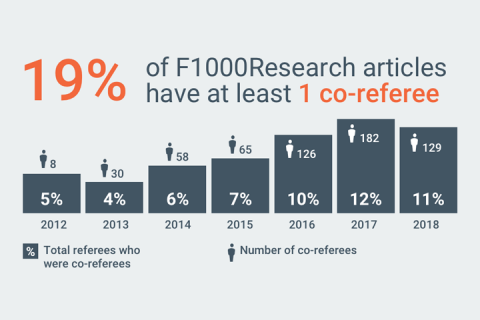F1000Research: author-led peer reviewer selection
| 20 September, 2018 | Rachel Campbell |
|

|
As not all of our authors may be familiar with our post-publication author-led peer review process, we provide as much guidance as we can to assist you. In this blog, we tell you about a useful resource available to you

Articles in F1000Research are formally peer reviewed during our post-publication author-led peer review process, meaning that it is primarily the authors’ responsibility to provide appropriate referee suggestions until their article has completed peer review. As not all of our authors may be familiar with this role, we’re keen to provide as much guidance as we can. To offer our support, we’ve recently updated our Tips for Finding Referees page, to help make the peer review process more accessible for our authors.
Finding suitable referees
We realise that our author-led peer review model may be new to some authors, so to offer our assistance we have recently re-vamped our Tips for Finding Referees page. We hope that this will clarify our referee criteria, and that it will become a useful resource for authors who need additional support with the referee search.
We’ve added some short ‘Dos and Don’ts’ to briefly guide authors in their search for suitable referees. Some of these drawn attention to areas which authors may not initially consider, for example requesting that they suggest a global spread of referees – whilst some articles will require a reviewer with local knowledge of the topic discussed, we also encourage diversity in the referee pool to gain a wider perspective on an article. For more information on how we’re trying to increase reviewer diversity, you may like to read our recently published blog post. Another important ‘Do’ reminds authors to get in touch with the team with any questions – we hope the Referee Criteria laid out in this page is clear, but are always happy to discuss this further, especially for potentially exceptional cases.
As expected, we’ve also taken the opportunity to update our list of tips to kick-start the referee search. For example, we have updated the information about our Referee Selector Tool. This tool algorithmically analyses submissions to produce a list of ranked potential referees, based on authors of related published work. We hope that this will help to make the referee finding process easier for authors, and point them in the right direction when beginning their search. Another method which is often useful is starting with the reference list of the article to identify authors of related work. Additionally, as experts in their field authors are often aware of other groups working on similar projects – searching for members of these groups is another good starting point when working to identify the most relevant reviewers.

So.. Why author-led?
We believe our author-led model contributes to a rigorous peer review process for many reasons. Firstly, as experts in their field authors are in the best position to provide suggestions of subject experts to review their article, and we believe that this can be an invaluable resource which should be acknowledged. In turn, these referees are able to provide us with the most informative reports. Referees who are experts in the field are also more likely to agree to review, and are best placed to give the most relevant feedback – this reduces the time taken for an article to complete peer review, and ensures that work is reviewed by true experts thoroughly. Authors will also be more aware of the potential conflicts of interest which certain referees may have, and can therefore avoid suggesting them as reviewers. This reduces the amount of unnecessary invitations sent to referees, whilst maintaining a fair and unbiased peer review process.
To ensure that we’re providing the best service possible, for the past year we have been contacting all of our authors once their article has received 2 referee reports, to ask for their feedback on our model and services. Almost 50% of surveyed authors agreed that they liked selecting the most appropriate referees themselves, with 71% believing that this allowed them to ensure that the referees have the right experience to review.
To ensure that the peer review process remains fair and transparent, our Editorial Team verify that every referee meets our Referee Criteria. As detailed on our Tips for Finding Referees page, our team is responsible for checking any referee suggestions for suitability, and act as mediators during the peer review process – overall upholding the integrity of the peer review process. Our team is also able to offer assistance with finding referees where necessary or required, simply get in touch with any queries.
We hope that our updates will make this page more informative for our authors looking for extra guidance with our author-led process. However, we’re always grateful for any feedback on our website – if you would like to get in touch with any suggestions of improvements we could make, please contact us via research@f1000.com.

|



User comments must be in English, comprehensible and relevant to the post under discussion. We reserve the right to remove any comments that we consider to be inappropriate, offensive or otherwise in breach of the User Comment Terms and Conditions. Commenters must not use a comment for personal attacks.
Click here to post comment and indicate that you accept the Commenting Terms and Conditions.